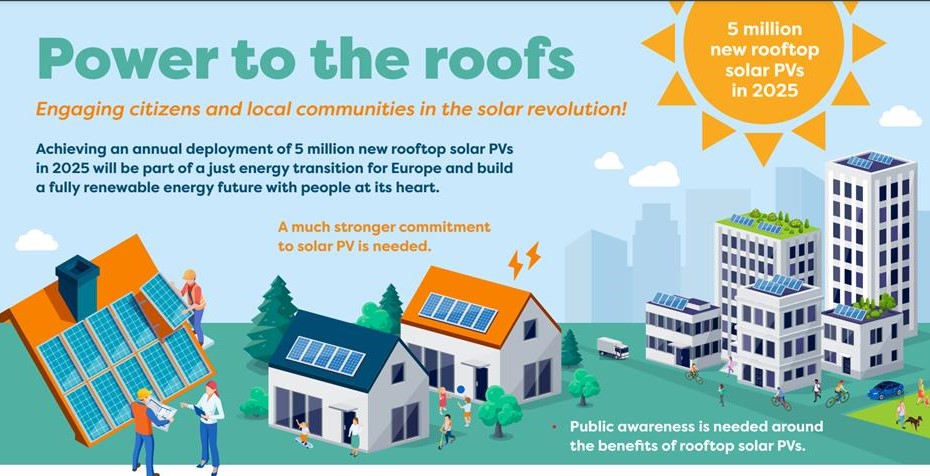A new report by the Climate Action Network (CAN) Europe with the contribution of The Green Tank, titled “Engaging citizens and local communities in the solar revolution, Rooftop Solar PV Country Comparison Report”, presents the current situation, the challenges and opportunities for residential rooftop solar PVs across 11 EU Member States.
Just before the publication of the Repower EU package and the EU Solar Energy Strategy, the report highlights the vast potential that the rooftop solar PVs have, especially at this time when the EU is in the midst of an energy crisis and at the same time is looking for ways to become independent from the Russian fossil gas. Solar energy, self- consumption and collective self- consumption can help to achieve a resilient, just, and independent energy system for Europe. The report focuses on legal, administrative and support measures and aims at detecting barriers at the national level that impede higher uptake of residential rooftop solar PVs. It also highlights good and bad practices and puts forward concrete policy recommendations for setting up the right regulatory framework to ensure accelerated uptake of rooftop solar.
Across the 11 Member States assessed in this report, most of the countries lack an adequate road-map/strategy with clear and ambitious goals and targets for rooftop solar PV. While some Member States have a longstanding tradition of supporting rooftop solar PVs through feed in tariffs, others have focused more on net metering schemes. Still most of the European countries have long, complex and burdensome administrative procedures that disincentivize citizen investment in rooftop solar PVs.
The report is based on qualitative information provided by The Green Tank and other CAN member organizations that answered a semi-structured questionnaire on the rooftop solar PV policies . A traffic light scoring is provided, with scores for each of the 11 EU Member States included in the analysis, in 6 key areas that affect the uptake of rooftop solar. The report concludes with policy recommendations for governance, incentives, permitting and administrative procedures, energy sharing, collective self- consumption, and energy communities.
More specifically for Greece, the assessment showed that even though Greece has taken significant steps developing solar PVs during the last decade, residential rooftop solar development has remained at low levels, as a consequence of regulatory and administrative barriers, such as the very frequent changes in legislation and the rejections in solar PV applications, as well as due due to the lack of electricity grid space.
Energy communities are the only existing scheme for collective energy sharing and collective self- consumption, meaning that they should be further supported in order to strengthen citizen participation in developing renewables for covering their own energy needs through net metering and virtual net metering schemes.
The report titled “Engaging citizens and local communities in the solar revolution, Rooftop Solar PV Country Comparison Report” was published on May 16, 2022 and is available here.
An interactive map that reveals how countries are performing on each of the areas examined can be found here. By clicking on a country, the country’s profile is displayed.
The Greek profile can be found here.



